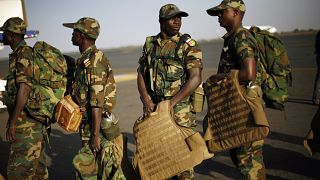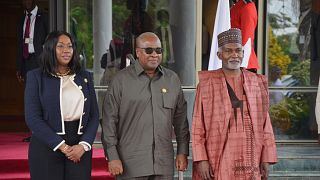Ghana
Standing near the dried river bed that marks Ghana’s northern border, Alima can see her hamlet, lying in Burkina Faso less than two kilometres (1.2 miles) away. Even though her home is just a short walk away, she says she will never go back there to live.
One night last year, jihadist gunmen arrived in the settlement and killed two watchmen. Alima and her sons hid with other women and children, while the men fled briefly across the river into Ghana. The next day families packed up and crossed the border.
Their arrival reinforced what Ghana’s government already knew: Ghana along with Gulf of Guinea neighbours Benin, Togo and Ivory Coast was fast becoming the new frontline in the Sahel jihadist war ravaging their northern neighbour.
"We are staying here for now," Alima said, looking over the border. "There is no security over there."
Togo, Benin and Ivory Coast have already been struck by gunmen from across their northern borders –- most recently in Benin, whose government has reported more 20 armed incursions since 2021. Togo has suffered at least five attacks in that time, though not all were confirmed by jihadists.
So far Ghana has escaped a direct attack, but it is already tackling the economic and social fallout from the conflict to its north.
Like its neighbours, Ghana struggles with porous borders, a weaker state presence in the north, chronic smuggling and intercommunal tensions that can be a breeding ground for jihadism, say local leaders, officials and experts.
Ghana’s government heeded the threat early, experts and officials say, opting for a comprehensive strategy of beefed-up military presence and community outreach to ease tensions and support local populations.
A French troop withdrawal from Mali in the face of mounting hostility and disputes with the ruling junta has refocussed Western partners to aid Gulf of Guinea nations battle the war's southward spillover.
British, US and French officials met with Gulf of Guinea governments in Accra in November to discuss increased cooperation, but with an eye on avoiding past multinational mistakes.
President Nana Akufo-Addo has pushed for "home-grown" local cooperation with neighbouring countries though the Accra Initiative on joint military operations and intelligence sharing.
But officials and local residents in north Ghana acknowledge the growing threat from militant groups operating just a few kilometres away.
"The threat is real, we are very close to the border," Stephen Yakubu, Ghana's Upper East Regional Minister, a presidential appointee, told AFP.
- Burkina burning –
The Sahel insurgency spread from Mali in 2012 to neighbouring Niger and Burkina Faso in 2015. Two million people have been displaced and thousands killed in Burkina Faso alone.
Last year Burkinabe troops carried out two coups in part over frustration with the war on jihadists, but turmoil in Ouagadougou only added to instability.
Security in Burkina has deteriorated rapidly in recent months, including more attacks towards eastern regions, which share borders with Togo, Benin and Ghana.
Ghana’s national security minister Albert Kan Dappah told a summit in December the spread was expected.
Military operations in the Sahel had prompted the Al-Qaeda-linked Support Group for Islam and Muslims (GSIM) and Islamic State in the Greater Sahara (ISGS) to shift south.
In northern Ghana's border area of Bawku, residents are fearful. With easy access to Burkina, Mali, Togo and Niger nearby, they say their frontier is exposed.
Bawku is a trading hub for agricultural produce and livestock with Burkinabe towns like Bittou, just a 45-minute drive away and the site of a December attack which killed six people.
Violence has already curtailed cross-border commerce, said Bawku municipal chief Amadu Hamza. "Only a few risk their lives to go," he told AFP. Regional minister Yakubu said the army is establishing small, forward bases along the border and the immigration service was boosting its frontier presence.
Ghanaian authorities last year captured two suspected jihadists sheltering in Ghana after being wounded over the border. One was arrested at a hotel and the other in a hospital.
"We are working with Burkina and sharing information," he said. "They were hurt. Operating there, they were hit and fled and came here."
Why has Ghana so far escaped attack? One answer may be its early response, more comprehensive approach and the current location of jihadist groups closer to Benin for now, said Saurea Stancioff from Promediation, a group involved in conflict mediation.
Financing may also be a factor. Ghana officials worry jihadists may be tapping into the country's large informal gold mining sector.
In a report last year, German think tank Konrad Adenauer Foundation and Promediation estimated around 200 Ghanaians had been recruited by jihadists over the border, though it was unclear how many may have returned.
"Ghana seems to be a rest area and arguably the groups want to keep it that way, at least for now," Stancioff said. "It is also a big trafficking area -- maybe they don’t want to jeopardise that."
- Internal conflict -
Despite avoiding an attack so far, Ghana's northern region of Bawku also has its own internal dispute some fear will distract from border security.
Heavy police and military presence around the town attest to tensions between ethnic Kusasi and Mamprusi over the right to chose a new chieftain.
Speaking to AFP from his palace, traditional ruler Bawku Naba Asigri Abugrago Azoka II said the local dispute is unlikely to benefit jihadists trying to gain leverage.
He said he had not heard of young men from his jurisdiction joining jihadists. But he said his community was in contact with chiefs across the border to share intelligence.
"If fire is burning someone close to your beard, you should dose your own beard with water because you never know when it will reach you," he said using a local saying.
Nearby a major border post and highway from Bawku into Burkina is heavily guarded with troops and immigration officials as trucks head north.
But in more rural areas along the more open border, Burkinabe displaced families easily cross the dry river bed on foot back into Burkina to tend their farms during the day. Their children still go to school there. But before night everyone returns to Ghana.
Burkinabe community leader Dauda Wahabu said the village was once peaceful. Only when they armed two watchmen did they come under attack. "We hear they are killing people still," he said. "We don’t know what will happen next so we will stay."
Local Ghana community leader Abdullah Zakaria said the Ghanaian army is nearby and locals are constantly in touch if they see anyone suspicious. But worry grows in border settlements.
"We are fearful they are going to come over here," he said. "This is going to get worst. This is not going to stop."












Go to video
AU names Burundian president special envoy for Sahel region
01:01
Burkina Faso to dissolve its electoral commission
01:38
Low turnout for municipal elections in Togo: Silent boycott or just a slow start?
Go to video
Togo holds first local elections since controversial power shift
01:00
Pix of the Day: July 16, 2025
Go to video
Islamic preachers in Burkina Faso rally against social media hate